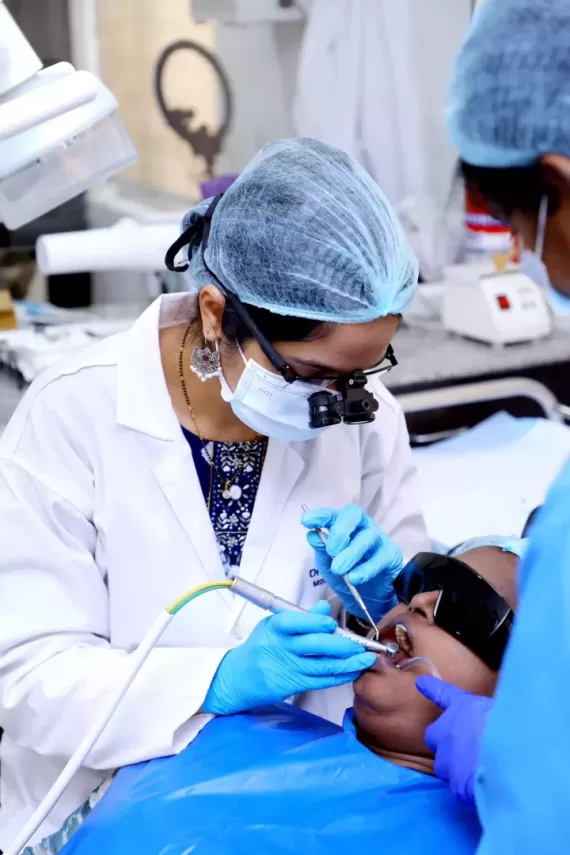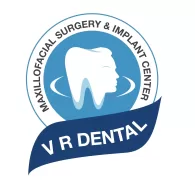Why choose VR Dental clinic Kukatpally for Root Canal Treatment?
Root canal therapy is a treatment for inflammation of the dental pulp(also called ‘endodontics’) is needed when the blood or nerve supply of the tooth (called the ‘pulp’) is infected through decay or injury at an affordable Root Canal Treatment cost in Kukatpally. Root canal infection is often asymptomatic and is detected from an X-ray image. Root canal therapy usually requires multiple care visits. You may not feel any pain in the early stages of the infection. The goal of root canal therapy, the prevention or elimination of apical periodontitis of endodontic origin, is closely coupled with the interest to quantify endodontic treatment success.
The aim of Root Canal Treatment (RCT) is to adequately disinfect the root canal system, with the objectives of preventing pain, infection, and tooth loss. Although RCT is an effective procedure with success rates of more than 82% to 92.6% , public perception is generally negative, with high levels of anxiety and fear, and a poor understanding of treatment benefits,. Historically, health professionals, specialist associations, and regulatory organizations have been responsible for educating and disseminating information to patients. Although there is a paucity of evidence specific to where patients seek information relating to endodontic treatment, a shift has been noted within health care more generally. Increasingly, patients are turning to alternative sources of information, with 45% of patients researching health care information before appointments with their health care professional.
Is Root Canal Treatment permanent?
Can I get the tooth extracted instead of root canal treatment?
Why Root Canal Treatment at V R DENTAL?
Root canal treatment can either be completed in a single session or in multiple sessions depending on the condition of the tooth and periapical condition
The V R Dental team is comprised of friendly and highly skilled individuals all driven by the same mission: to give you the best dental experience possible.
Everyone in our practice, from our front office team to our hygienists and dental assistants wants to give you the highest level of quality dental care. You will feel this the moment you step into our office all the way until your scheduled appointment is over.
When permanent dental pulp damage is detected in a tooth, the damaged tissue and any microbial growth are removed from the pulp chamber. The root canals are disinfected and treated with medication. Finally, the treated root canal is filled and the tooth is restored.
-
- The individual care visits are long, but usually, no more than two visits are needed. The restoration of the tooth often requires a separate visit.
-
- If necessary, root canal therapy is always performed under local anesthesia. Sedative premedication can be administered before the therapy. The success of root canal treatment is usually controlled by clinical examination and X-ray images within one year of the operation.
Root canal Treatment
![[Downloader.la]-6142e0031bf35 root canal treatment cost in kukatpally](https://vrdental.co.in/wp-content/uploads/2017/08/Downloader.la-6142e0031bf35-590x350.jpg)
How do you know if you need a root canal?

Dr. Ram mohan

Dr. Vyshnavi CH

Dr. Shiva
Why is root canal treatment needed?
If the pulp becomes infected, the infection may spread through the root canal system of the tooth. This may eventually lead to an abscess. An abscess is an inflamed area in which pus collects and can cause swelling of the tissues around the tooth. The symptoms of an abscess can range from a dull ache to severe pain, and the tooth may be tender when you bite. If root canal treatment is not done, the infection will spread and the tooth may need to be taken out.
Does root canal treatment hurt?
No. Usually, a local anesthetic is used and it should feel no different from having an ordinary filling done. There may be some tenderness afterward but this should gradually get less over time. What does it involve? The aim of the treatment is to remove all the infections from the root canal. The root is then cleaned and filled to prevent any further infection. Root canal treatment is a skilled and time-consuming procedure. Most courses of treatment will involve two or more visits to your dentist.
At the first appointment, the infected pulp is removed and any abscesses can be drained. The root canal is then cleaned and shaped ready for the filling. A temporary filling is put in and the tooth is left to settle. The tooth is checked at a later visit and when all the infection has cleared, the tooth is permanently filled.
What will my tooth look like after treatment?
In the past, a root-filled tooth would often darken after treatment. However, with modern techniques, this does not usually happen. If there is any discoloration, there are several treatments that will restore the natural appearance.
What if it happens again?
Root canal treatment is usually very successful. However, if the infection comes back, the treatment can sometimes be repeated.
What if I don’t have the treatment?
The alternative is to have the tooth out. Once the pulp is destroyed it can’t heal, and it is not recommended to leave an infected tooth in the mouth. Although some people would prefer to have the tooth out, it is usually best to keep as many natural teeth as possible.
Will the tooth be safe after treatment?
Yes. However, because a ‘dead’ tooth is more brittle, you may need to have a crown to provide extra support and strength to the tooth. Where is root canal treatment carried out? Root canal treatment is a routine dental procedure, which your dentist will be happy to do for you. However, sometimes your dentist may refer you to an endodontist, who is a specialist in this type of treatment.
How do I care for my tooth afterward?
Root-treated teeth should be looked after just the same as any other tooth. Remember to clean your teeth last thing at night and at least one other time during the day, with fluoride toothpaste. Cut down on sugary foods and drinks, and have them only at mealtimes if possible. See your dental team as often as they recommend for regular check-ups. Root canal work involves removing the infected pulp and filling the root canals. The root canals are extremely small and are rarely straight.
We have highly skilled professionals who can offer just this type of expertise. Root canal treatment is an established form of dental treatment which can help preserve teeth that might otherwise be lost, producing consistently good results for many years to come.

Sometimes called endodontic treatment, the procedure is required when the pulp inside the tooth has become infected or died as a result of accidental damage or decay. The only alternative to endodontic treatment is the extraction of the tooth. The treatment normally would take two visits to complete. If you have chosen to have the treatment under a Local Anaesthetic, the tooth and surrounding area will be made numb so you will not feel any pain. All the infected pulp is removed. The canals are cleaned with strong antiseptics and then sealed. Sometimes, this first filling is temporary, and the canals are filled permanently once the area has settled down.
If the tooth is left weakened, we may recommend a crown to strengthen it. Treating the infection prevents it from spreading throughout the root canal system of the tooth. If this were to be left unchecked, the most likely result would be an abscess – a condition that can be extremely painful and may ultimately lead to damage to the bone around the tooth. Even if the abscess is painless, if left untreated, it may compromise any further treatment planned on the tooth, such as crowns.
What can I eat after a root canal?
After a root canal, try to eat soft foods that require very little chewing, like applesauce, yogurt, eggs, and fish. Avoid hard or hot foods that might hurt your teeth. Do not eat for a few hours until the numbness in your mouth wears off so you don’t bite your cheek or tongue.
What not to do after a root canal?
After a root canal, make sure to follow all of your endodontist’s instructions, which most often include avoiding hard or especially chewy foods, brushing twice a day, and being very cautious around the area where the root canal procedure was completed.
